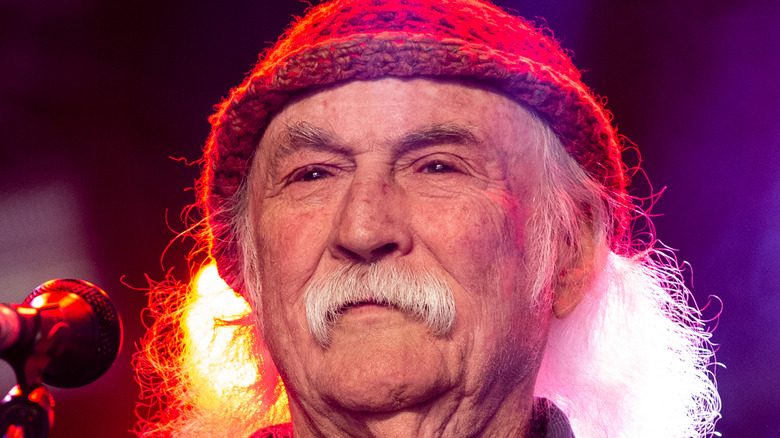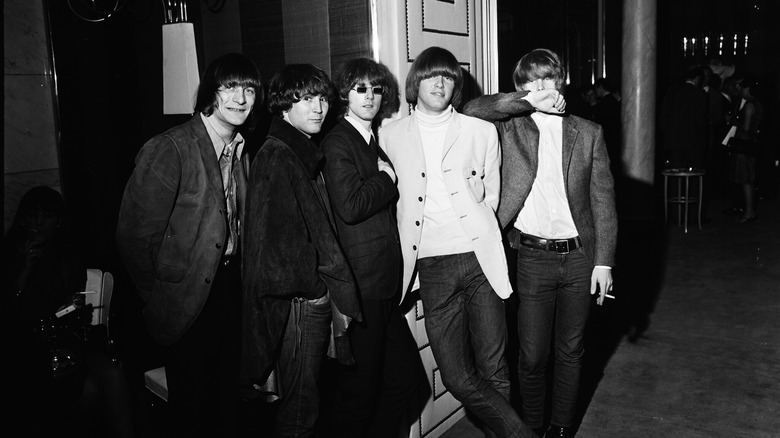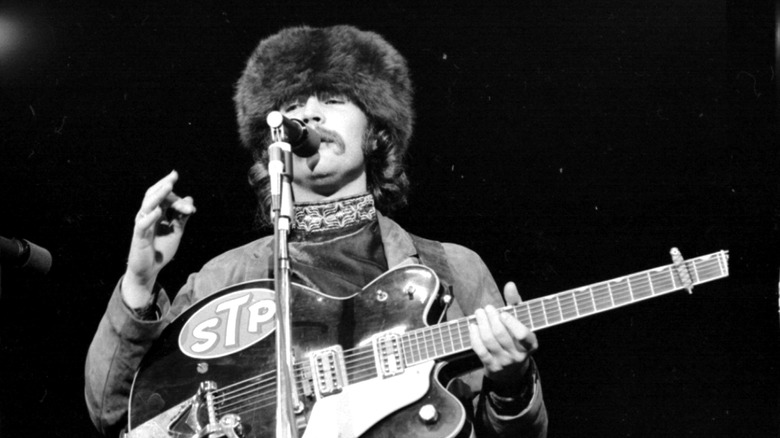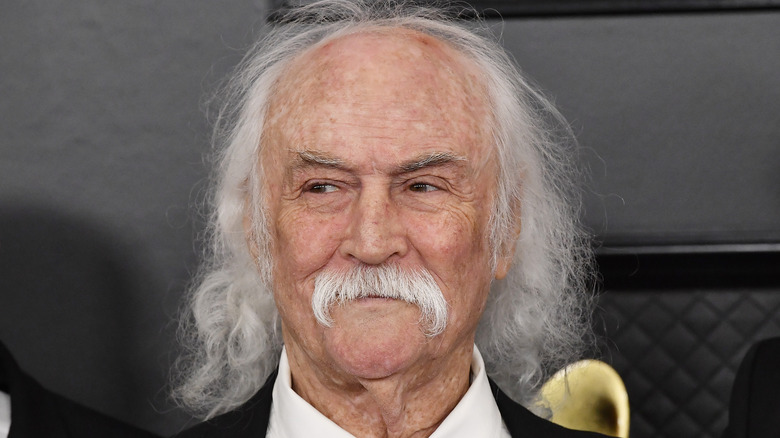Why John Kennedy's Assassination Contributed To David Crosby Leaving The Byrds
Folk rock musician David Crosby, born in Los Angeles on August 14, 1941, gained an interest in the arts at an early age. His father was award-winning cinematographer Floyd Crosby, and in college, David pursued acting. However, as noted by Variety, he dropped out and ultimately decided to follow a different path as a musician instead. Crosby performed in folk clubs as a solo artist before eventually forming The Byrds in the mid-'60s with Roger McGuinn, Chris Hillman, Gene Clark, and Michael Clarke. After a few years, however, Crosby was out of the group.
In 1968, Crosby formed a group with two other musicians, Stephen Stills and Graham Nash. Neil Young joined the band a year later, and the group became known as Crosby, Stills, Nash & Young (CSNY). Crosby's time with the group didn't last due to differences he had with Young, and he left the band in 1970. In an interview with Billboard in 2019, Crosby talked about his short time with the two bands. He said, "I can be contentious. Opinionated. I'm comfortable with that." In regard to his experience with CSNY, Crosby stated that the members were competitive and "s**ty" to each other. There may have been many different reasons why Crosby left both bands, but with The Byrds, one of the reasons had something to do with John F. Kennedy's assassination.
David Crosby was described as insufferable
There were conflicts among the members of The Byrds, and just a couple of years after the band's formation, two of its members — Gene Clark and Michael Clarke — had left, and Crosby (second from left) was kicked out soon after. There were reports that one of the reasons why he was let go was that his song "Triad" was not included in the band's record; instead, a cover of Carole King's "Going Back" was chosen, as reported by Farout Magazine. That allegedly caused Crosby to feel bitter, which was why he left the group.
In 2018, however, Crosby candidly talked about the real reason he was let go from The Byrds. In the film "Echo in the Canyon," he revealed that it had nothing to do with "Triad." "They threw me out of The Byrds because I was an a-hole," Crosby stated. Roger McGuinn also discussed Crosby's departure when he was interviewed for the 2019 documentary titled "David Crosby: Remember My Name." In it, as noted by the Los Angeles Times, McGuinn said that his bandmate "had become insufferable." Crosby also told his bandmates that they weren't good enough as musicians. But it seemed like the final straw for McGuinn was Crosby's opinions on the John F. Kennedy assassination.
David Crosby's thoughts about the Kennedy assassination
Roger McGuinn still recalled where he was and what he was doing when John F. Kennedy was assassinated on November 22, 1963. He told Rolling Stone that he was a staunch supporter of the politician. Shortly after Kennedy's death, he alluded to the incident in his rewording of the traditional folk song "He Was a Friend of Mine," which was recorded years later and included in the album "Turn! Turn! Turn!"
In 1967, The Byrds was part of the lineup at the Monterey International Pop Festival, and just before they played "He Was a Friend of Mine," Crosby spoke into the microphone and told the crowd his theory about Kennedy's assassination by saying that he was killed by more than one individual. "The story has been suppressed, witnesses have been killed, and this is your country," he continued, as reported by Gaslight Records. McGuinn wasn't happy about the incident and said that Crosby was trying to act like "Mr. Cool" when he said those words. Just months after, McGuinn and Chris Hillman paid a visit to Crosby's home and told him that they no longer wanted him in The Byrds, as it was impossible to deal with him. Crosby admitted that it "hurt like hell" (via the Los Angeles Times).
He still had the same opinion decades later
In the documentary "David Crosby: Remember My Name," the musician said that he no longer talked to his former bandmates and that they dislike him. In August 2019, Roger McGuinn responded in a tweet and tagged Crosby wherein he stated that it wasn't true. Chris Hillman also spoke about Crosby in 2018 and said that he cared for him. "He's a mischievous little bad boy, still, but I do love him dearly," he stated, as reported by Ultimate Classic Rock. The disagreements among the musicians decades prior may have been water under the bridge, but Crosby stuck to his beliefs about Kennedy.
In July 2022, Crosby was featured in Rolling Stone's Ask Croz, wherein he answered a series of questions sent by fans. One query was whether he had changed his thoughts about the Kennedy assassination after years of investigations into the matter. "Absolutely not," Crosby answered. He then went on to write about why he thought Kennedy was shot by more than one person and why he believed he was killed. "He was unpopular with the power structure, and that's why he got killed ... I'm firmly convinced that I'm right," he continued.



